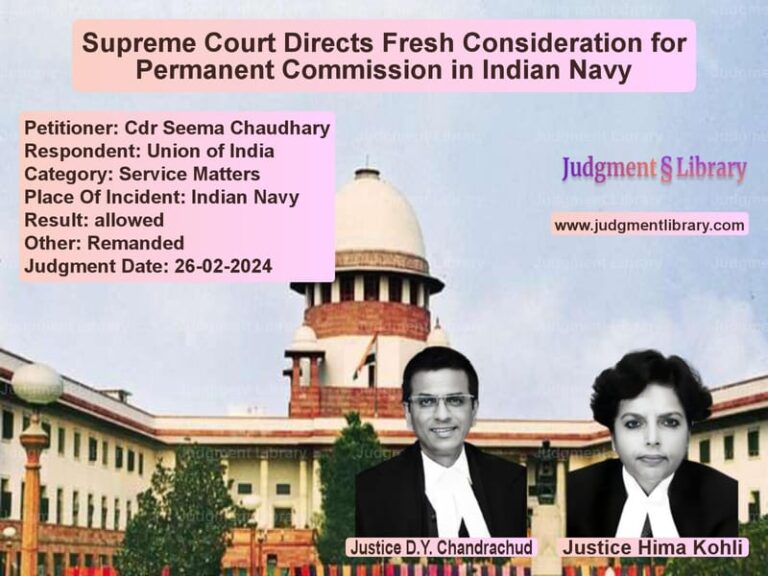Supreme Court Upholds Preventive Detention Under Tamil Nadu Goondas Act
The case of E. Subbulakshmi vs. Secretary to Government & Others is a crucial Supreme Court ruling delivered on November 17, 2016. The case addresses the legality of preventive detention under the Tamil Nadu Prevention of Dangerous Activities Act, 1982 (commonly known as the Tamil Nadu Goondas Act). The petitioner, E. Subbulakshmi, challenged the detention of her son, Murugan, arguing that procedural lapses and lack of proper evidence rendered the detention illegal.
Background of the Case
Murugan, the son of the petitioner, was detained under the Tamil Nadu Goondas Act through an order issued by the Commissioner of Police, Chennai on December 4, 2015. The detention was based on his involvement in multiple criminal activities, including offenses under Sections 341, 294(b), 323, 384, 506(II) IPC and violations under the Tamil Nadu Public Property (Prevention of Damage and Loss) Act. The authorities deemed his activities prejudicial to public order and sought his detention to prevent him from engaging in further offenses.
The petitioner initially filed a writ petition before the Madras High Court (HCP No. 117/2016) challenging the detention order. However, the High Court dismissed the petition, prompting her to file a Special Leave Petition (SLP) before the Supreme Court.
Key Legal Issues Considered
- Was the detention order valid despite procedural defects alleged by the petitioner?
- Did the authorities provide proper communication to the detenu and his family?
- Was the detention based on inadmissible or unreliable evidence?
- Did the authorities violate the procedural safeguards established by previous Supreme Court judgments?
Arguments Presented
Petitioner (E. Subbulakshmi) Arguments:
- The detention order failed to specify the duration of detention, making it legally unsustainable.
- The detenu’s family was not informed about his detention at the earliest opportunity, violating his fundamental rights.
- The detention order relied on a confessional statement that did not bear the signature of the detenu, making it inadmissible.
- The copy of the FIR (Crime No. 598/2015) provided to the detenu was illegible, preventing him from making an effective representation.
- A government order referenced in the detention order was not supplied to the detenu, making the detention illegal.
Respondents (State of Tamil Nadu) Arguments:
- The detention order was issued under the Tamil Nadu Goondas Act, which allows detention for a period of up to 12 months.
- Murugan was a habitual offender with multiple cases against him, justifying his detention to maintain public order.
- The detenu’s brother was informed of his detention through a registered post on December 6, 2015, fulfilling the communication requirement.
- The alleged confessional statement was not the sole basis of detention; the authorities also considered multiple FIRs and past criminal behavior.
- The reference to the government order was related to the delegation of powers to the Commissioner of Police and was not a document relied upon for detention.
Supreme Court’s Observations
The Supreme Court examined the petitioner’s claims against the factual findings of the High Court and the state authorities. The Court ruled:
“The detention order clearly states that it shall remain in force for 12 months upon confirmation by the appropriate authority. The argument that no specific period was mentioned is without merit.”
The Court further held:
- The family was informed of the detention through registered post, fulfilling the procedural requirement.
- The alleged confessional statement was only one of several factors considered, and its absence did not vitiate the detention.
- The FIR copy provided to the detenu was a photocopy, and while some portions were unclear, it did not prevent the detenu from making a representation.
- The government order referenced in the detention order was about procedural delegation and was not relied upon for the subjective satisfaction of the detaining authority.
The Court also emphasized that preventive detention is an extraordinary measure, but when exercised within constitutional limits, it serves a valid purpose in maintaining public order.
Final Judgment
The Supreme Court ruled:
- The detention of Murugan was valid and complied with procedural and substantive requirements.
- The petition was dismissed, and the detention order was upheld.
- All claims of procedural lapses were rejected as either unsubstantiated or non-material.
Impact of the Judgment
This ruling has significant legal implications:
- It affirms that preventive detention orders must be based on multiple factors, and a missing confessional statement does not invalidate detention.
- It sets a precedent on the validity of procedural communication through registered post in preventive detention cases.
- It clarifies that minor defects in document legibility do not necessarily render a detention order unlawful.
- It underscores the Supreme Court’s reluctance to interfere with the subjective satisfaction of the detaining authority unless clear violations occur.
Conclusion
The Supreme Court’s decision in E. Subbulakshmi vs. Secretary to Government & Others reinforces the legal framework surrounding preventive detention. By upholding the detention of Murugan under the Tamil Nadu Goondas Act, the judgment ensures that habitual offenders can be detained when their activities threaten public order. The ruling also affirms the principle that procedural safeguards must be met, but minor lapses that do not materially impact the detenu’s rights do not invalidate a detention order.
Don’t miss out on the full details! Download the complete judgment in PDF format below and gain valuable insights instantly!
Download Judgment: E. Subbulakshmi vs Secretary to Governm Supreme Court of India Judgment Dated 17-11-2016.pdf
Direct Downlaod Judgment: Direct downlaod this Judgment
See all petitions in Bail and Anticipatory Bail
See all petitions in Extortion and Blackmail
See all petitions in Fraud and Forgery
See all petitions in Judgment by A M Khanwilkar
See all petitions in dismissed
See all petitions in supreme court of India judgments November 2016
See all petitions in 2016 judgments
See all posts in Criminal Cases Category
See all allowed petitions in Criminal Cases Category
See all Dismissed petitions in Criminal Cases Category
See all partially allowed petitions in Criminal Cases Category







